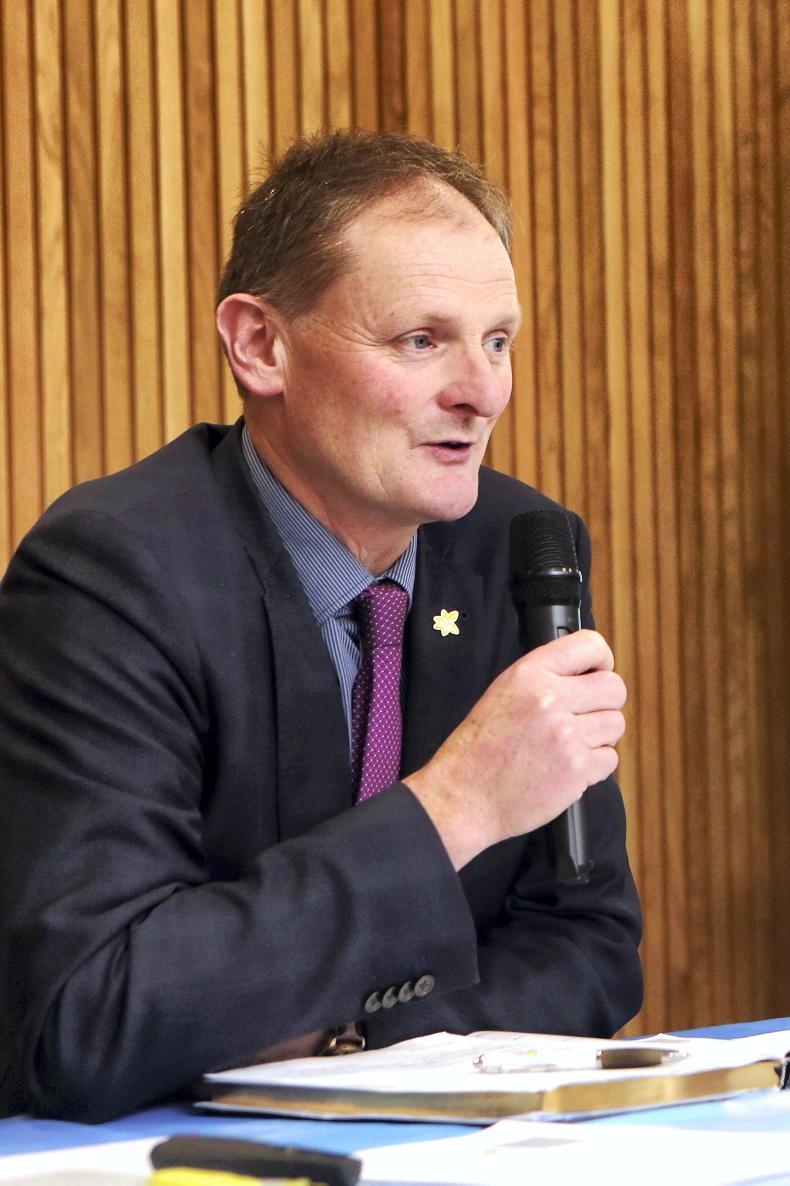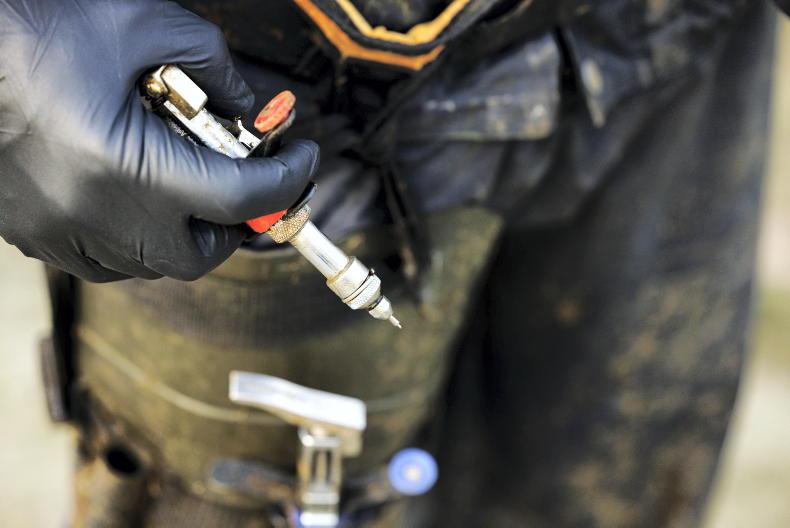The president of the Ulster Farmers’ Union (UFU), David Brown, has warned DAERA that his organisation will take “whatever action is necessary” to block government plans to reduce the amount paid for TB reactor animals.
It comes after DAERA opened an eight-week public consultation, which sets out proposals to reduce the rate payable, potentially starting in the 2024/2025 financial year, when compensation would be cut to 90% of market value. From year two onwards, reactors would be paid to 75% of their market value.
As well as saving money, the Department maintains that the move will help achieve behavioural change among farmers by encouraging them “to take all reasonable steps to prevent disease”.
However, the proposals have been described as a “new low point” by the UFU, especially when DAERA’s plans to start dealing with TB in wildlife remain on hold.
“TB is absolutely a massive issue for our membership – I can’t think of anything bigger,” said Brown, who added that the UFU executive has given the green light for a legal challenge if DAERA proceeds with payment cuts.
When asked on what issue the UFU might take a case, Brown responded: “We will find a legal basis or a technicality to make it happen.”
He is keen that individual UFU members respond to the consultation and also refused to rule out other action, including a mass protest.
Response
The consultation comes in response to a direction given by NI Secretary of State, Chris Heaton-Harris, in September 2023, when he told all government departments to look at options to raise revenue and tackle the issue of unsustainable public finances.
In the case of DAERA, he instructed officials to consult on reducing the compensation rate for TB reactors.
The current best estimate is that £37.1m will be paid out as compensation for TB reactor animals in 2023/2024. Assuming similar pay-outs in future years, a 10% reduction in market value would save £3.71m and a 25% reduction would save £9.3m.
Spiralled
The cost of the wider TB programme in NI has spiralled in recent years, due mainly to more TB reactor values being found and an increase in the value of cattle.
In March 2022, annual TB herd incidence (the number of new reactor herds out of the total tested) was just below 9%, but in the latest results to October 2023, it is 10.31%.
Higher beef and dairy prices have also increased the value of cattle, with the average paid for a reactor in October 2021 being £1,632, compared to £1,874 in October 2023.
In 2022/2023, total costs for the TB programme hit a new record high of £53m. Proposals to reduce reactor values have been made before, including in a consultation on a new TB eradication strategy released in 2021.
However, by the time this strategy was launched in 2022, former DAERA Minister Edwin Poots had decided to defer any potential cuts for at least two years and link their implementation to the roll-out of work to control TB in wildlife.
Since then, that plan to control TB in wildlife has been effectively blocked by badger campaign groups, who won a legal case against DAERA last October.

UFU president David Brown. \ Houston Green
Implications
There is also an acknowledgement in the DAERA consultation that despite paying 100% of the TB reactor value, a disease breakdown has significant financial implications for farmers.
Additional costs associated with the likes of lost production and genetics have previously been estimated at £10m per year.
“The position remains, however, that the costs of the programme cannot be sustained, particularly in the context of ongoing financial constraints across all government departments,” notes the DAERA consultation.
The document asks respondents whether they agree that public expenditure savings should be made by reducing the compensation rate for TB reactor animals.
The consultation is open from 12 January until 8 March.
Read more
Caught again in a spiral of TB testing
Pause in collection of bovine TB levy
The president of the Ulster Farmers’ Union (UFU), David Brown, has warned DAERA that his organisation will take “whatever action is necessary” to block government plans to reduce the amount paid for TB reactor animals.
It comes after DAERA opened an eight-week public consultation, which sets out proposals to reduce the rate payable, potentially starting in the 2024/2025 financial year, when compensation would be cut to 90% of market value. From year two onwards, reactors would be paid to 75% of their market value.
As well as saving money, the Department maintains that the move will help achieve behavioural change among farmers by encouraging them “to take all reasonable steps to prevent disease”.
However, the proposals have been described as a “new low point” by the UFU, especially when DAERA’s plans to start dealing with TB in wildlife remain on hold.
“TB is absolutely a massive issue for our membership – I can’t think of anything bigger,” said Brown, who added that the UFU executive has given the green light for a legal challenge if DAERA proceeds with payment cuts.
When asked on what issue the UFU might take a case, Brown responded: “We will find a legal basis or a technicality to make it happen.”
He is keen that individual UFU members respond to the consultation and also refused to rule out other action, including a mass protest.
Response
The consultation comes in response to a direction given by NI Secretary of State, Chris Heaton-Harris, in September 2023, when he told all government departments to look at options to raise revenue and tackle the issue of unsustainable public finances.
In the case of DAERA, he instructed officials to consult on reducing the compensation rate for TB reactors.
The current best estimate is that £37.1m will be paid out as compensation for TB reactor animals in 2023/2024. Assuming similar pay-outs in future years, a 10% reduction in market value would save £3.71m and a 25% reduction would save £9.3m.
Spiralled
The cost of the wider TB programme in NI has spiralled in recent years, due mainly to more TB reactor values being found and an increase in the value of cattle.
In March 2022, annual TB herd incidence (the number of new reactor herds out of the total tested) was just below 9%, but in the latest results to October 2023, it is 10.31%.
Higher beef and dairy prices have also increased the value of cattle, with the average paid for a reactor in October 2021 being £1,632, compared to £1,874 in October 2023.
In 2022/2023, total costs for the TB programme hit a new record high of £53m. Proposals to reduce reactor values have been made before, including in a consultation on a new TB eradication strategy released in 2021.
However, by the time this strategy was launched in 2022, former DAERA Minister Edwin Poots had decided to defer any potential cuts for at least two years and link their implementation to the roll-out of work to control TB in wildlife.
Since then, that plan to control TB in wildlife has been effectively blocked by badger campaign groups, who won a legal case against DAERA last October.

UFU president David Brown. \ Houston Green
Implications
There is also an acknowledgement in the DAERA consultation that despite paying 100% of the TB reactor value, a disease breakdown has significant financial implications for farmers.
Additional costs associated with the likes of lost production and genetics have previously been estimated at £10m per year.
“The position remains, however, that the costs of the programme cannot be sustained, particularly in the context of ongoing financial constraints across all government departments,” notes the DAERA consultation.
The document asks respondents whether they agree that public expenditure savings should be made by reducing the compensation rate for TB reactor animals.
The consultation is open from 12 January until 8 March.
Read more
Caught again in a spiral of TB testing
Pause in collection of bovine TB levy







 This is a subscriber-only article
This is a subscriber-only article











SHARING OPTIONS: